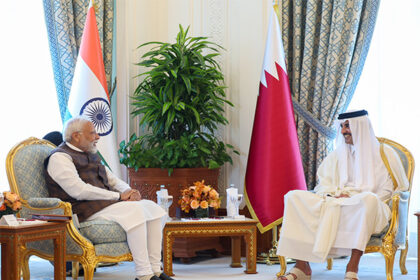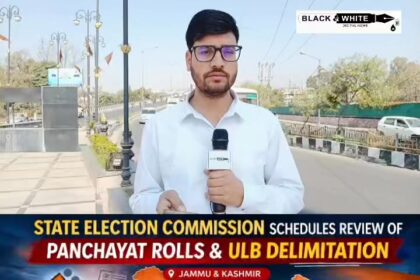||Black and White Digital News ||
||Parvinder Singh July 26,2024||
New Delhi: In a comprehensive address to Parliament, Mian Altaf, the MP representing the Anantnag-Rajouri-Poonch constituency, raised a series of pressing concerns about the state of governance and infrastructure in Jammu and Kashmir (J&K). His detailed critique touched on various aspects, from the lack of development plans for tribal communities to the inefficiencies of the Border Roads Organisation (BRO) and the broader issues of corruption and unemployment.
Tribals’ Plight and Infrastructure Deficits:
Mian Altaf highlighted the absence of a strategic roadmap for the tribal population in J&K, stressing the government’s failure to provide essential services such as roads and hospitals in tribal areas. He pointed out that tribals, who have been residing in these regions for over four to five decades, face significant challenges in obtaining housing due to bureaucratic hurdles, particularly the difficulty in securing No Objection Certificates (NOCs) from the forest department. Despite government claims of support for tribals, the ground reality shows a stark contrast.
BRO’s Performance and Road Network Woes:
Altaf criticized the Border Roads Organisation (BRO) for not meeting required standards and timelines, resulting in deteriorating road conditions in the Pir Panjal region. He called for a thorough investigation into BRO’s operations and demanded immediate improvements to the road network, which is vital for the socio-economic development of the area.
Finance Minister’s Disparity in Engagement:
While appreciating the Finance Minister’s efforts, Altaf questioned the disparity in stakeholder engagement, particularly the exclusion of J&K’s MPs and local business organizations from budget discussions. He attributed this to the absence of a popular government, which has left bureaucrats to make decisions without adequate input from elected representatives and grassroots stakeholders. This exclusion has led to a disconnect between the government’s policies and the needs of the people.
Elections and Bureaucratic Governance:
The MP expressed frustration over the delay in conducting elections in J&K, emphasizing that the region is currently under bureaucratic rule rather than democratic governance. He stressed the necessity of restoring a representative government to ensure that local issues are addressed effectively and that the people have a voice in decision-making processes.
Corruption and Youth Unemployment:
Altaf condemned the high levels of corruption in government offices, linking it to the severe unemployment crisis in J&K. He pointed out that the lack of job opportunities has driven many young people towards substance abuse, highlighting the government’s failure to provide a stable and supportive environment for the youth.
Contractor Payment Delays and Financial Strain:
The issue of non-payment to contractors was a significant point in Altaf’s speech. He noted that many local contractors have faced substantial financial losses and have become bank defaulters due to the government’s failure to clear their dues. He criticized the current budget for not addressing these liabilities, leaving contractors without the necessary relief.
GP Fund and Pension Delays:
Altaf raised concerns about the delays in General Provident (GP) Fund payments to government employees and pensions to retirees, attributing these delays to deficits in government treasuries. He argued that these financial mismanagement issues contradict the government’s claims of efficient governance.
Healthcare and Infrastructure Concerns:
The MP voiced concerns over the lack of essential facilities at the Medical College in Anantnag, particularly the absence of MRI services. He called for improved road connectivity from Anantnag to Pahalgam to alleviate traffic congestion during the annual Amarnath Yatra. Furthermore, he criticized the current state of the Sher-i-Kashmir Institute of Medical Sciences (SKIMS), citing a shortage of doctors and unfilled vacancies, which he attributed to a loss of autonomy similar to the downgrade from statehood to Union Territory status.
Neglect of Border Districts:
Altaf emphasized the neglect of border districts like Rajouri and Poonch, which were not allocated funds for crucial programs such as PMGSY, Jal Shakti, and PWD in the budget. He called for immediate attention to the infrastructure needs of these regions, which are vital for their development and security.
Daily Wagers and PHE Employees:
Highlighting the plight of daily wagers and Public Health Engineering (PHE) employees, Altaf criticized the government for not paying their salaries, leading to significant financial hardships for these workers.
Request for Broader Investigations:
Altaf urged an investigation into the delayed road work from Kulgam connecting Damal Hanjipora and Ramban to Mahore, demanding transparency and accountability in government projects. He also discussed these issues with the Defence Minister, seeking solutions for the affected people in hilly regions.
Functioning of Medical College in Anantnag:
Mian Altaf also focused on the deficiencies in healthcare, specifically citing the lack of MRI facilities at the Medical College in Anantnag. He emphasized that as one of the oldest and largest districts in the Union Territory, Anantnag requires better medical infrastructure. Additionally, he highlighted the need for a bypass road to connect Anantnag to Pahalgam to mitigate the traffic congestion during the Amarnathji Yatra, which exacerbates the daily commute for residents.
Autonomy of Premier Institutions:
In his critique, Altaf mentioned the Sher-i-Kashmir Institute of Medical Sciences (SKIMS), now under the Health and Medical Department. He condemned the reduction of autonomy for this premier institution, comparing it to the broader loss of statehood autonomy, now reduced to Union Territory status. He highlighted the shortage of doctors and unfulfilled vacancies as indicators of the government’s failure to maintain the institution’s standards.
Mian Altaf’s comprehensive address underscored the urgent need for responsive governance and immediate attention to the infrastructural, economic, and social issues in J&K. His call for a more inclusive approach to budget discussions, prompt elections, and accountability in government operations reflected the growing frustrations of the people in his constituency. Altaf’s speech served as a stark reminder of the critical gaps in governance and the pressing need for a more participatory and transparent administration in J&K.
*video courtesy sansad tv*
Leave a comment
You Might Also Like
India Stands Firmly In Solidarity With Qatar: PM Modi
India Stands Firmly In Solidarity With Qatar: PM Modi Prime Minister Narendra Modi on Tuesday spoke with Sheikh Tamim bin…
4 Min Read
Hum Hindustan Ko Bharat Mata Aur Gandhi Ji Ko Father Of Nation Kehte Hai Baki Kisi Ko Hum Kuch Nhi Samajte Sunil Dimple Reacts PM Narendra Modi Statement
Hum Hindustan Ko Bharat Mata Aur Gandhi Ji Ko Father Of Nation Kehte Hai Baki Kisi Ko Hum Kuch Nhi…
0 Min Read
Rafiq Malik Names Ashiq Hussain as Jammu & Kashmir LJP Vice President
Rafiq Malik Names Ashiq Hussain as Jammu & Kashmir LJP Vice President #JammuKashmir #JKPolitics #LJP #RafiqMalik #AshiqHussain #PoliticalUpdate #JKNews #PartyAppointment…
0 Min Read
State Election Commission Reviews Panchayat Rolls 2026, ULB Delimitation in J&K
State Election Commission Reviews Panchayat Rolls 2026, ULB Delimitation in J&K #JammuAndKashmir #JKElections #StateElectionCommission #PanchayatElections #ULBDelimitation #PanchayatRoll2026 #ULBElections #JKPolitics #LocalBodyElections…
0 Min Read









